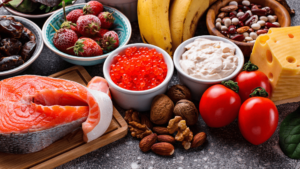
It’s natural to feel down in the dumps sometimes but it seems to be happening more and more in 2020. Eating is a popular way to try and make yourself feel happier, but it turns out there are certain foods you can eat that will naturally boost your mood.
1. Dark Chocolate
Chocolate is rich in many mood-boosting feel-good compounds, such as caffeine, theobromine, and N-acylethanolamine — a substance chemically similar to cannabinoids that has been linked to improved mood. Chocolate is high in health-promoting flavonoids, which have been shown to increase blood flow to your brain, reduce inflammation, and boost brain health, all of which may support mood regulation. It also has a high hedonic rating, meaning that its pleasurable taste, texture, and smell may also promote good mood.
2. Fatty Fish
Omega-3 fatty acids are a group of essential fats that you must obtain through your diet because your body can’t produce them on its own. Fatty fish like salmon and albacore tuna are rich in two types of omega-3s (DHA and EPA), that are linked to lower levels of depression. Omega-3s contribute to the fluidity of your brain’s cell membrane and appear to play key roles in brain development and cell signalling. Most experts agree that adults should get at least 250–500 mg of combined EPA and DHA per day.
3. Fermented Foods
Fermented foods, which include kimchi, yogurt, kefir, kombucha, sauerkraut or a sprouted and fermented protein may improve gut health and mood. The fermentation process allows live bacteria to thrive in foods that are then able to convert sugars into alcohol and acids, during this process, probiotics are created. These live microorganisms support the growth of healthy bacteria in your gut and may increase serotonin levels.
4. Bananas
Bananas are high in vitamin B6, which helps synthesise feel-good neurotransmitters like dopamine and serotonin. One large banana provides 16 grams of sugar and 3.5 grams of fiber. When paired with fiber, sugar is released slowly into your bloodstream, allowing for stable blood sugar levels and better mood control. As mentioned above, blood sugar levels that are too low may lead to irritability and mood swings.
5. Berries
Eating more fruits and vegetables is linked to lower rates of depression. Although the mechanism isn’t clear, a diet rich in antioxidants may help manage inflammation associated with depression and other mood disorders. Berries pack a wide range of antioxidants and phenolic compounds, which play a key role in combating oxidative stress, an imbalance of harmful compounds in your body.

